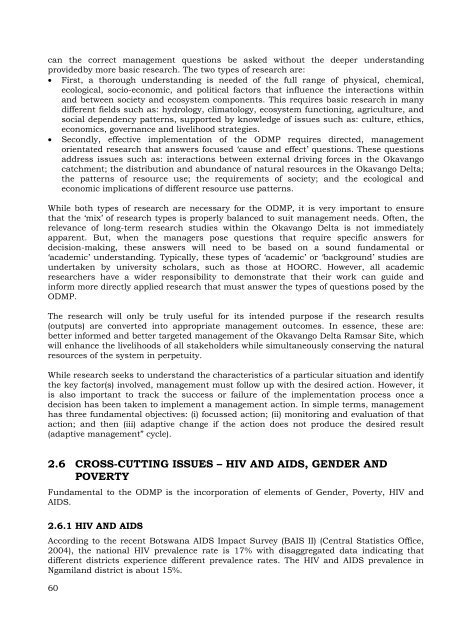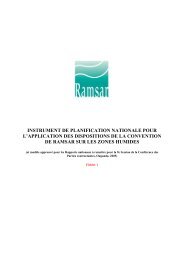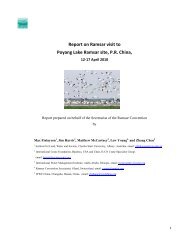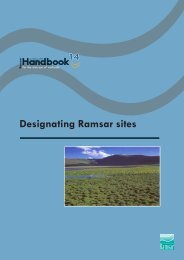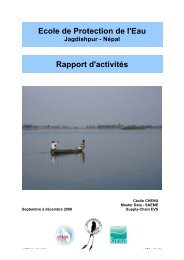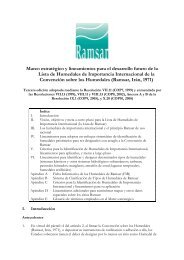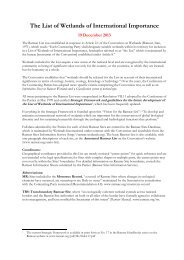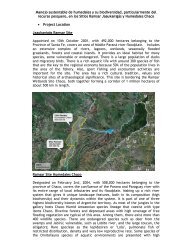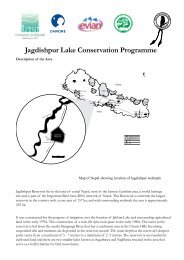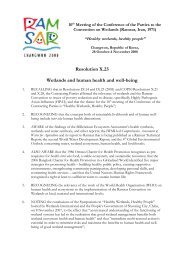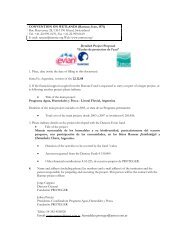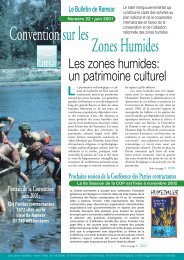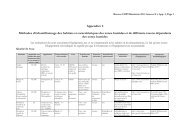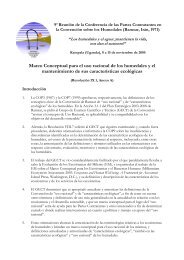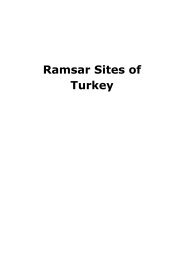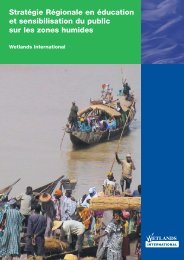Okavango Delta Management Plan - Ramsar Convention on Wetlands
Okavango Delta Management Plan - Ramsar Convention on Wetlands
Okavango Delta Management Plan - Ramsar Convention on Wetlands
You also want an ePaper? Increase the reach of your titles
YUMPU automatically turns print PDFs into web optimized ePapers that Google loves.
can the correct management questi<strong>on</strong>s be asked without the deeper understanding<br />
providedby more basic research. The two types of research are:<br />
• First, a thorough understanding is needed of the full range of physical, chemical,<br />
ecological, socio-ec<strong>on</strong>omic, and political factors that influence the interacti<strong>on</strong>s within<br />
and between society and ecosystem comp<strong>on</strong>ents. This requires basic research in many<br />
different fields such as: hydrology, climatology, ecosystem functi<strong>on</strong>ing, agriculture, and<br />
social dependency patterns, supported by knowledge of issues such as: culture, ethics,<br />
ec<strong>on</strong>omics, governance and livelihood strategies.<br />
• Sec<strong>on</strong>dly, effective implementati<strong>on</strong> of the ODMP requires directed, management<br />
orientated research that answers focused ‘cause and effect’ questi<strong>on</strong>s. These questi<strong>on</strong>s<br />
address issues such as: interacti<strong>on</strong>s between external driving forces in the <str<strong>on</strong>g>Okavango</str<strong>on</strong>g><br />
catchment; the distributi<strong>on</strong> and abundance of natural resources in the <str<strong>on</strong>g>Okavango</str<strong>on</strong>g> <str<strong>on</strong>g>Delta</str<strong>on</strong>g>;<br />
the patterns of resource use; the requirements of society; and the ecological and<br />
ec<strong>on</strong>omic implicati<strong>on</strong>s of different resource use patterns.<br />
While both types of research are necessary for the ODMP, it is very important to ensure<br />
that the ‘mix’ of research types is properly balanced to suit management needs. Often, the<br />
relevance of l<strong>on</strong>g-term research studies within the <str<strong>on</strong>g>Okavango</str<strong>on</strong>g> <str<strong>on</strong>g>Delta</str<strong>on</strong>g> is not immediately<br />
apparent. But, when the managers pose questi<strong>on</strong>s that require specific answers for<br />
decisi<strong>on</strong>-making, these answers will need to be based <strong>on</strong> a sound fundamental or<br />
‘academic’ understanding. Typically, these types of ‘academic’ or ‘background’ studies are<br />
undertaken by university scholars, such as those at HOORC. However, all academic<br />
researchers have a wider resp<strong>on</strong>sibility to dem<strong>on</strong>strate that their work can guide and<br />
inform more directly applied research that must answer the types of questi<strong>on</strong>s posed by the<br />
ODMP.<br />
The research will <strong>on</strong>ly be truly useful for its intended purpose if the research results<br />
(outputs) are c<strong>on</strong>verted into appropriate management outcomes. In essence, these are:<br />
better informed and better targeted management of the <str<strong>on</strong>g>Okavango</str<strong>on</strong>g> <str<strong>on</strong>g>Delta</str<strong>on</strong>g> <str<strong>on</strong>g>Ramsar</str<strong>on</strong>g> Site, which<br />
will enhance the livelihoods of all stakeholders while simultaneously c<strong>on</strong>serving the natural<br />
resources of the system in perpetuity.<br />
While research seeks to understand the characteristics of a particular situati<strong>on</strong> and identify<br />
the key factor(s) involved, management must follow up with the desired acti<strong>on</strong>. However, it<br />
is also important to track the success or failure of the implementati<strong>on</strong> process <strong>on</strong>ce a<br />
decisi<strong>on</strong> has been taken to implement a management acti<strong>on</strong>. In simple terms, management<br />
has three fundamental objectives: (i) focussed acti<strong>on</strong>; (ii) m<strong>on</strong>itoring and evaluati<strong>on</strong> of that<br />
acti<strong>on</strong>; and then (iii) adaptive change if the acti<strong>on</strong> does not produce the desired result<br />
(adaptive management” cycle).<br />
2.6 CROSS-CUTTING ISSUES – HIV AND AIDS, GENDER AND<br />
POVERTY<br />
Fundamental to the ODMP is the incorporati<strong>on</strong> of elements of Gender, Poverty, HIV and<br />
AIDS.<br />
2.6.1 HIV AND AIDS<br />
According to the recent Botswana AIDS Impact Survey (BAIS II) (Central Statistics Office,<br />
2004), the nati<strong>on</strong>al HIV prevalence rate is 17% with disaggregated data indicating that<br />
different districts experience different prevalence rates. The HIV and AIDS prevalence in<br />
Ngamiland district is about 15%.<br />
60


